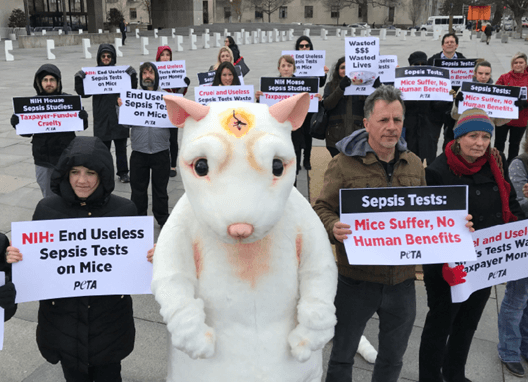NIH Moves Away From Cruel Sepsis Experiments on Mice After PETA Lawsuit
For Immediate Release:
June 18, 2024
Contact:
Tasgola Bruner 202-483-7382
PETA is celebrating major progress for animals and a possible turning point for how the government funds scientific research after one of the biggest funders of sepsis experiments on mice announced at a recent conference that it will stop funding the most common types of these experiments on animals and instead shift resources toward superior, human-relevant methods.
The move by the National Institute of General Medical Sciences, part of the National Institutes of Health (NIH), follows years of pressure from PETA and the group’s ongoing lawsuit challenging the agency’s continued funding of failed sepsis experiments on mice and other animals.
In sepsis experiments, mice are commonly injected with toxins or feces, subjected to invasive surgeries, force-fed harmful bacteria, and/or made to inhale a bacterial “slurry.” The animals endure fever, chills, diarrhea, difficulty breathing, lethargy, disorientation, shock, and multiple organ failure before they eventually die.

“Pulling the funding from sepsis experiments on mice that do nothing but waste taxpayers’ money and animals’ lives is overdue but welcome,” says PETA scientist Dr. Emily Trunnell. “PETA calls on NIH to stop all sepsis experiments conducted on animals and focus exclusively on superior, animal-free research that could actually help human patients.”
PETA’s lawsuit alleges that funding sepsis experiments on animals abuses the agencies’ discretion and violates their obligation to fund research to improve human health and minimize the use of animals in experiments. The lawsuit points to the decades of failures of sepsis experiments on mice and NIH’s acknowledgment that mice and humans don’t experience the same condition.
Sepsis, the body’s extreme response to infection, affects one in three patients who die in hospitals and at least 1.7 million Americans in a typical year. Experiments on animals have failed to lead to effective treatments. A 2013 landmark study revealed that sepsis doesn’t affect humans as it does mice, and then-NIH Director Francis Collins lamented the “loss of decades of research and billions of dollars” in the development of 150 drugs that successfully treated sepsis in mice but failed to do so in humans. At least 15 peer-reviewed publications over the past 20 years have described how sepsis in humans differs from sepsis in other animals.
PETA—whose motto reads, in part, that “animals are not ours to experiment on”—points out that Every Animal Is Someone and offers free Empathy Kits for people who need a lesson in kindness. For more information, please visit PETA.org or follow the group on X, Facebook, or Instagram.


